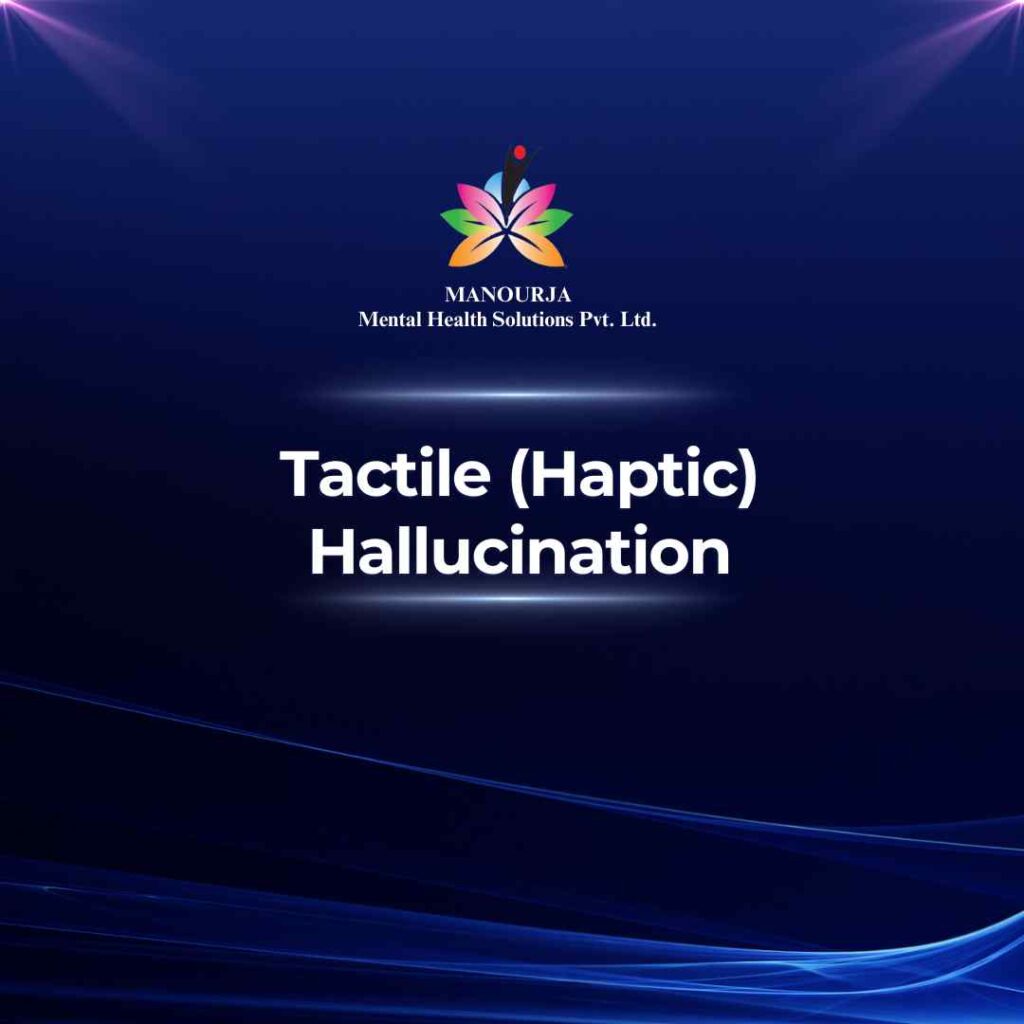Tactile (Haptic) Hallucination

A tactile (haptic) hallucination is a type of sensory experience where an individual feels physical sensations on or within their body that have no external cause. These sensations can include feelings of being touched, pressure, itching, burning, or even the movement of objects on or under the skin. The experiences are vivid and real to the person but are not actually occurring.
Tactile (Haptic) Hallucination as a Sign and Symptom of Mental Illness
Tactile hallucinations are typically associated with severe psychiatric or neurological conditions. They reflect a disruption in the normal processing of sensory information by the brain, leading to false perceptions. These hallucinations can be distressing and may significantly impact an individual’s ability to function normally.
Mental Illnesses with Tactile (Haptic) Hallucination as Symptoms
- Schizophrenia: Tactile hallucinations can occur in schizophrenia, often alongside auditory and visual hallucinations. They may be experienced as a sensation of being touched or as more distressing feelings like insects crawling on the skin (formication).
- Delirium: In cases of severe confusion and rapid changes in brain function, such as those seen in delirium, tactile hallucinations can occur. This is often due to underlying medical conditions or substance intoxication/withdrawal.
- Substance-Induced Psychotic Disorder: Certain drugs, particularly stimulants like cocaine and methamphetamine, can cause tactile hallucinations during intoxication or withdrawal phases. This includes sensations like bugs crawling on or under the skin, known as “cocaine bugs” or “meth mites.”
- Parkinson’s Disease: Some individuals with Parkinson’s disease may experience tactile hallucinations, which could be related to the disease itself or as a side effect of medication.
- Lewy Body Dementia: This type of dementia often includes visual hallucinations, but tactile hallucinations can also be present.
- Major Depressive Disorder with Psychotic Features: In severe cases, individuals with major depressive disorder may experience psychotic symptoms, including tactile hallucinations.
Managing and Treating Tactile (Haptic) Hallucinations
Treatment for tactile hallucinations involves addressing the underlying cause and may include:
- Antipsychotic Medications: These are commonly used to treat hallucinations in schizophrenia, schizoaffective disorder, and severe mood disorders with psychotic features.
- Substance Detoxification and Rehabilitation: For substance-induced tactile hallucinations, detoxification and rehabilitation programs are essential.
- Medical Treatment for Underlying Conditions: Managing medical conditions like Parkinson’s disease, Lewy body dementia, or other neurological disorders that might be causing the hallucinations.
- Cognitive Behavioral Therapy (CBT): This can help individuals challenge and cope with their hallucinations by teaching strategies to manage distressing symptoms.
- Supportive Therapy: Providing emotional and psychological support to individuals experiencing hallucinations can help them cope with the distress associated with these experiences.
- Hospitalization: In severe cases, where hallucinations significantly impair functioning or pose a risk to the individual or others, hospitalization may be necessary for stabilization and intensive treatment.
Early diagnosis and comprehensive treatment are crucial for managing tactile hallucinations and improving the quality of life for affected individuals.
At MANOURJA, we believe in the transformative power of counseling. Our experienced therapists offer a safe and supportive space where you can explore your thoughts, emotions, and challenges. Through personalized counselling sessions, we’ll work together to develop coping strategies, build resilience, and achieve lasting positive change. Discover the path to a healthier, happier you with MANOURJA counselling services.
MANOURJA Rehabilitation Services
At MANOURJA, we’re dedicated to helping you in rebuild your life, after difficult times. Our rehabilitation services focus on understanding what you need to move forward, whether you’re recovering from addiction, trauma, or any psychological – social challenges. We create personalized plans, that are all about helping you, regain your strength and find hope again. With a caring team by your side, you’ll have the support to make real progress and take steps toward a brighter, healthier future.
